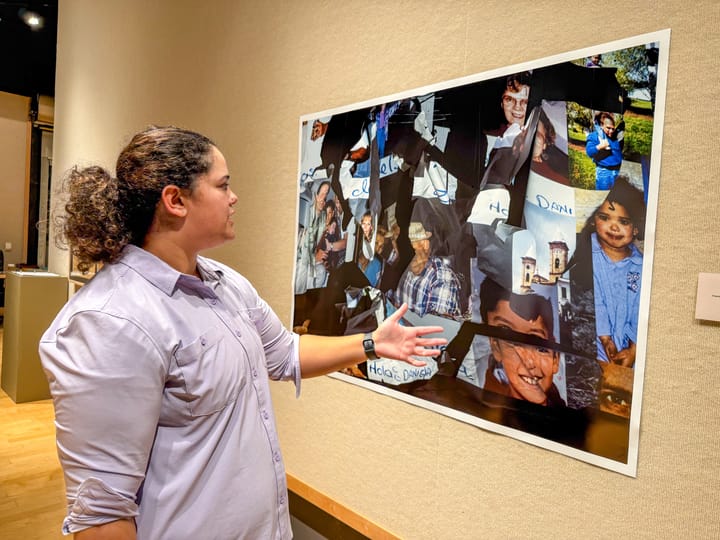Dune: visually attractive, but unengaging

Directed by Denis Villeneuve (Arrival, Blade Runner 2049), 2021’s Dune is a grand sci-fi epic based on the 1965 novel of the same name by Frank Herbert.
A visually dazzling tale of galactic political intrigue, the film unleashes viewers into a compelling and well-crafted universe.
Despite its ambitions, however, the movie loses its epic feel in the second half and risks underwhelming the audience.
The film follows Paul Atreides (Timothée Chalamet), the heir to the Great House Atreides, as his family is ordered by the galactic emperor to take control of the desert planet Arrakis, home of the prized drug “spice,” from the militant House Harkonnen that previously ruled it.
Primarily staying true to the source material, the pillar of Villeneuve’s Dune is how forcefully it recreates the expansive world of the novel.
Within the first 10 minutes of the film, the audience is introduced to the galactic empire and the Great Houses that it consists of, as well as the political tensions that are currently plaguing it.
Other houses of the empire are afraid of the rising strength of House Atreides — led by Paul’s father, Leto II (Oscar Isaac), and his mother, Lady Jessica (Rebecca Ferguson) — and see Arrakis as a way to challenge its power.
The broad scope of the film is brought to life by the strong performances of the expansive ensemble cast.
From the start, Isaac’s warm-but-assured Leto II makes the leadership of House Atreides feel real. Jason Momoa’s comedic portrayal of Duncan Idaho, one of Paul’s mentors, is countered by Josh Brolin’s more stern portrayal of Gurney Halleck, another mentor. This natural dynamic fleshes out the minutiae of House Atreides. As the judge of the change of Arrakis, Sharon Duncan-Brewster reveals the inner workings of the empire with her faction-split depiction of Dr. Liet-Kynes.
All of the lore of the movie and its universe would be for naught, however, if it weren’t for the groundbreaking, awe-inducing visuals of the film, led by production designer Patrice Vermette (Sicario, Arrival), a longtime collaborator of Villeneuve.
The most visually apparent elements — and most engaging as a result — are the costume and scenic designs. Each major faction has a distinct look that captures its culture, such as the Fremen’s desert-centered adaptable clothing and the Harkonnen’s dark and brutal military-style garb.
The scenic design expands upon this individuality by making the home planets of each Great House unique. Additionally, through its barren and expansive landscapes, Vermette captures the breathtaking harshness of Arrakis.
Working in tandem with the visuals of the movie, the soundtrack — composed by Hollywood veteran Hans Zimmer (Inception, Interstellar, Dunkirk) — further brings the universe of Dune to life. It switches between orchestral and traditional with a frequent underscore of synths and chanting vocals. As a result of this mix, the soundtrack conveys the harrowing conditions of Arrakis while still including the monumental, futuristic feel of the galactic empire.
The engaging lore and design only sustain Dune for so long, however. At the halfway point of the film, the grand story starts to shift and falls apart as a result.
While the beginning of the movie throws the audience into the universe of Dune and all its complexities, narrative events cause the second half of the film to focus primarily on Paul and his mother, with much of the supporting cast gone.
This change causes a halt in the story’s momentum. Urgency is natural when focusing on the entire galaxy. The lives of two people, however, do not carry this same sense of energy.
Chalamet’s acting also falls flat during this section, mainly due to his reserved style. As the heir to a Great House, Paul is a naturally complex character filled with uncertainties, and while Chalamet depicts this well, it doesn’t lend itself to a gripping, epic story when the rest of the cast leaves and he’s the only one on screen.
For the audience, all of this can feel like narrative whiplash. An epic film should feel epic, and this tight focus simply doesn’t allow for that. By narrowing in on a smaller story arc, Villeneuve abandons what makes the first half of the film so engaging.
Overall, the film’s second half is still visually attractive, but that can’t keep the audience engaged when the plot is so uneventful. While Villeneuve succeeds in crafting an enthralling universe of monumental scale, the film’s plot in the last half undercuts what makes the rest of Dune so impressive.



